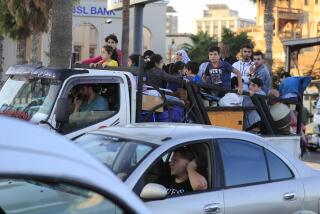Hussein Short on Hometown Sympathy
- Share via
HAWA, Iraq — The members of the Zahum clan were near the end of a 150-mile quest to rescue a relative when they saw the bombs fall Sunday.
They looked at the empty Republican Guard base across the road in this town and barely paused.
“All are gone,” said Amir Thruy Zahum, 24, who was walking to Tikrit to rescue an uncle. “There is no army left. I’m happy because we want peace. We’ve seen a lot of war. We don’t want to see any armies or any war anymore.”
It was a lonely trip from Mosul, Iraq’s third-largest city, for Zahum, his brother Said, 23, and cousin Khalaf Abid Zahum, 29. Downtown Tikrit, still held by Saddam Hussein loyalists, was just 10 miles away.
Two allied bombs hit targets to the west of Tikrit, sending huge plumes of grayish-brown smoke skyward. Zahum said the bombs struck in the area of Hussein’s humble birthplace, the village of Al Auja.
By Sunday afternoon, the Zahums had traveled 140 miles, often walking, to the base where abandoned materiel was the only remaining military presence.
“No one could have stopped here before,” Zahum said, his delight that he was able to do so now undiminished by the fact that the facility has become a prime target for the allied warplanes overhead.
For years, Hussein has tried to sell himself as the rightful heir to Tikrit’s first favorite son, Saladin, who captured Jerusalem from the Christian Crusaders in the 12th century. The Iraqi president even took on the name al-Tikriti to claim a more prestigious lineage and disguise that he was born poor and unwanted.
As he rose quickly, and ruthlessly, through the ranks of the ruling Baath Party, Hussein surrounded himself with more Tikritis, making the northern backwater of about 30,000 people the fulcrum of his regime.
Yet, like many other Tikritis, Zahum said he will be just as glad as any other Iraqi to see the end of Hussein’s rule. Said Zahum lifted his robe to show how dirty the garment was and how poor the family had become even as Hussein and those close to him enriched themselves.
As the Zahums watched, looters entered the base. They were dressed in civilian clothes and didn’t seem to be working as a group. No one stopped to explain why so many men wanted thousands of machine guns.
Three men escaping Tikrit in the back of a dump truck held a bedsheet high over their heads as a large white flag that they hoped would ward off jets circling above.
“America! America!” they cheered gleefully at a journalist who stopped to photograph the burning bridge.
A passenger in a small car held a small white cloth out the rear window, where it was barely visible from the road, let alone from the cockpit of a warplane searching for military targets.
“We are a country rich in oil, but look at us -- we can only walk,” Zahum said. “We are tired of this. No one’s salary is big enough, which is why we all must smuggle just to make a living.”
Eventually, the Zahums and others in their clan hope to make it to Baghdad, which they believe will be safer. That leg of the journey will come after they gather up the uncle who has refused to flee.
More to Read
Sign up for Essential California
The most important California stories and recommendations in your inbox every morning.
You may occasionally receive promotional content from the Los Angeles Times.













